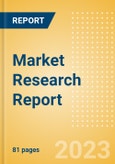Key takeaways from this report include:
- The healthcare industry continues to face the challenges such as persistent inflation in a post-COVID-19 world.
- Even though inflation is on its way down, it will remain elevated in 2023, continuing to pressure the healthcare sector.
- Although situation has improved in most of the countries, risings costs still triggered patients to postpone or stop treatments in H1 2023.
- Despite some improvement, “out of pocket” costs were an important factor for patients when choosing a treatment in H1 2023.
- Surveyed HCPs expected drug prices to grow with inflation rate.
- Despite the pharma industry’s skepticism, US HCPs believed that the Inflation Reduction Act could lead to lower drug prices.
- Physicians agreed that biosimilars could provide costs savings for the patients and healthcare systems and their use should be encouraged.
- Drug pricing control and movement towards preventive care were highlighted as the top solutions to reduce inflation in the healthcare sector.
Key Highlights
Despite decreasing inflation rates, the healthcare sector will face turbulent times in 2023.Despite some improvement, rising costs are forcing patients to postpone or stop treatments; it will take years for the backlogs to clear.
Drug pricing control and movement towards preventive care may be reliable methods to reduce inflation in the healthcare sector.
Scope
This report combines information obtained from secondary sources and primary research with healthcare industry professionals, key opinion leaders (KOLs), and physicians from different therapy areas (medical oncology, hematology, cardiology, vascular medicine, primary care, internal medicine, endocrinology, gynecology/obstetrics, orthopedic surgery, and gastroenterology). The interviews and surveys with physicians and KOLs were conducted between January 2023-May 2023.Study objectives
- Assess the impact of inflation on the healthcare sector
- Highlight the impact of inflation on patient treatment
- Capture physicians’ opinions on drug price growth
- Identify possible inflation reduction measures in the healthcare sector
- Explore physicians’ views on inflation reduction acts, such as the IRA
- Assess physicians’ opinions on biosimilar use as a mean to provide cost savings
- Compare results with previous, 2022 survey findings
Reasons to Buy
- Develop and design your corporate strategies post-Brexit through an in-house expert analysis of the key factors to impact the post-Brexit UK healthcare industry.
- Develop business strategies by understanding the key factors to impact healthcare research and manufacturing in the UK post-Brexit.
- Stay up to date on the industry’s changing sentiment towards Brexit from within the healthcare industry.
- Identify emerging industry trends post-Brexit to gain a competitive advantage.
- Understand current macro events impacting healthcare industry in the UK post-Brexit.
Table of Contents
Companies Mentioned (Partial List)
A selection of companies mentioned in this report includes, but is not limited to:
- American Association of Retired Persons
- Biotechnology Innovation Organization
- British medical journal
- Bureau of Labour Statistics
- British medical journal
- Bank of England
- Bank of Japan
- Centers for Medicare & Medicaid Services
- European Central Bank
- European Medicines Agency
- Federal Open Market Committee
- US Department of Health & Human Services
- International Monetary Fund
- Institute of Statistics and Economic Studies
- National Medical Products Administration
- Organization for Economic Cooperation and Development
- Office of National Statistics
- US Preventive Services Task Force
- World Economic Forum
- AbbVie
- National Health Insurance
- Pharmaceutical Research and Manufacturers of America
- Merck
- Biogen
- Sanofi
- Italian Association for Accessible Medicines
- BioSim
- National Health Service








